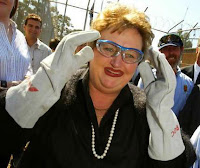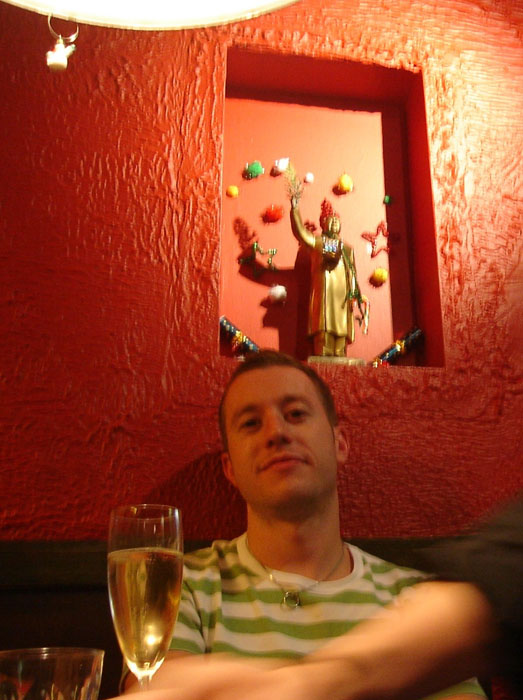state i'm in: relaxing saturday.
tune: damn "got to go".
 what sort of cretin would support child abuse? even the perpetrators of it would almost invariably admit it as a wrongdoing. so there can be no argument made by john howard that those that oppose his plans are akin to supporters of child abuse. i won't buy into that sort of rubbish.
what sort of cretin would support child abuse? even the perpetrators of it would almost invariably admit it as a wrongdoing. so there can be no argument made by john howard that those that oppose his plans are akin to supporters of child abuse. i won't buy into that sort of rubbish.and what is to be gained by an insensitive and paternalistic approach to the issue of child abuse and neglect in indigenous communities? if the past can be used as any sort of evidence, it will not be much.
perhaps a reaffirmation of mr howard's credentials as a pragmatist who makes little exception to following through with his first intentions, regardless of how ill-informed, irrational, or briefed by ideology they might be. after the recent bumbling aberrations made to this trend in his dealing with such issues as industrial relations laws and climate change, it was high time for such an occasion. and what better way than to impose his will upon such a vulnerable and isolated community such as remote aborigines, a group rarely in favour with joe average and his suburban neighbours, and whom to deal with liberally is little short of electoral poison. ("if those silly aborigines just lived like us, everything would be ok", i hear ringing through the 'burbs.)
but first allow me to present the aboriginal community of cherbourg*, in central queensland. whilst not remote in the sense of many NT communities, cherbourg had always faced similar problems, namely substance abuse issues, and child and domestic violence. fed up with these issues, a local womens' group was established, and has gone about rectifying the problems through involvement of the whole community with health, education, housing and welfare, and through engaging local and state governments. they have had a great deal of success: the community is dry, and has had only one report of child abuse this year, which was reported and dealt with within the community; the number of children attending school has increased, and health outcomes have also improved. this town is a model of what can be done with some self-determination in a community, and with the support at different levels of government. The community has supported its men, and their behaviour and degree of community involvement has been improved immensely. a mens' group has now been established in cherbourg, housed in a hall on local council-donated land, so the men can teach the younger generation how to be effective community members.
the other community i would like to mention is mutitjulu, near uluru in NT. again, mutitjulu once harboured the problems that plague many aboriginal communities: there was considerable violence in the community, and youth high on petrol fumes would terrorise the locals. the community was unable to secure adequate street-lighting to make its streets safer, nor the funding to help with the problems of the wayward youth. coupled with the inherent remote issues of isolation from health and education, inadequate housing, and poor access to adequate and fresh food, and in spite of being so close to one of the "richest" parts of australia (uluru and the surrounding resorts), mutitjulu was in a state of blight. again, with self-determination, the use of fume-less opal fuel, rehabilitation of the youth, and some (long-in-coming) help from the NT government, these problems have been largely addressed. a report published in 2006 failed to find evidence of abuse capable of prosecution in this community, local elders claim. the question is: "why us, and why now?"
these issues were first brought up academically in the 1970s, and reiterated most recently in reports in 2002 and 2006, while health minister tony abbott applauded increases in life expectancy of indigenous people (wow, only 17 years behind now). in the past, mr howard's response to pleas from aboriginal leaders for assistance on the issue of substance abuse and the physical abuse of women and children has effectively been "i am sure the state's have the answers". so far, they haven't. action has been required at a federal, state and local government level, as well as at a community level, with much interaction. so why mutitjulu, and why now?
but the timing of such a response is not what i am concerned with. the crux of my anxieties is that such a lightning response pays no dues to the cultural and spiritual sensitivities of the aboriginal people, nor is it likely to instill any sort of faith, lost over past generations, in the current program. action has been sorely needed, but this effort makes little sense, and i fear for its outcome.
mandatory wholesale health checks of women and children was the initial order of the day, but this idea was quickly abandoned after former australian medical association (AMA) president dr bill glasson and greens senator and leader bob brown (a medical doctor also), observed that this would be entirely illegal (not to mention unethical). further to this, there exists in aboriginal communities much fear of the australian health system. many people enter it, but far fewer actually leave it. for many, hospitals themselves are seen as a place one will likely die if they enter. this sort of mistrust of the health system must be addressed with community consultation, and liaison with aboriginal health workers, before any such large scale programs are instigated. one cannot expect immediate trust, but enough to allow parents to take their children to a clinic, confident that they will leave better for the experience, must be a priority.
there must also be trust within the community that this program will not lead to another stolen generation. likewise, this point of contention has not been addressed - ministers have refused to make guarantees that children will not be forcibly removed from their parents. this may be wise, in that if there exists a great threat to the child's welfare, removal may be the ultimate answer, as is also carried out in non-indigenous australian society. however more assurances need to be made to the communities, with the endorsement of aboriginal health workers and law enforcement officers, that this will not be the case on a widespread basis. already we have heard reports of aboriginal women taking to the sand hills and dry gullies near mutitjulu with their children to prevent such an occurrence.
the other major problem with mr howard's program is the removal of title of the land upon which the aborigines live, for apparently five years (although no guarantees have been made that this will not be extended at a later date). living on government annexed land only further entrenches the issue of dependence in the communities, and offers no immediate future of self-determination, the likes of which has seen cherbourg stave off many of its threats from within. the opinion of the AMA, informed by reams of research, is that aboriginal communities and individuals fare far better when the direction of their community, and the ownership of their land, is held within. health outcomes have been invariably improved where this is seen. this evidence-based standpoint runs completely at odds with the howard government's program, a program claimed to be aimed at improved health outcomes and futures for children.
so, do i support the howard government's current initiative to improve the health outcomes and futures of indigenous children? well, not really. there exists some decent ideas, but employed with half-baked methodologies, i see them making little long-term impact; more black history, likely.
*i hope to visit cherbourg later this year in order to gain more knowledge about the health issues and faced by aborigines in communities and some of their solutions, at which time i will likely report back.
---
image: public domain


























